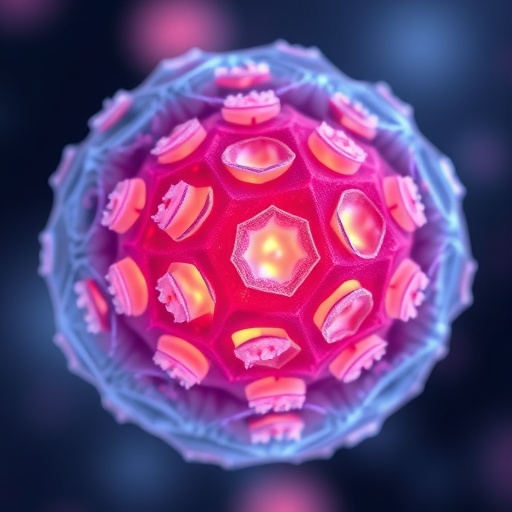In the rapidly evolving landscape of immunotherapy, researchers have unveiled a strikingly innovative approach that could revolutionize how chimeric antigen receptor (CAR) T cells are generated and deployed to combat cancer and autoimmune diseases. This novel strategy circumvents the traditional, labor-intensive ex vivo manufacturing processes by enabling the generation of CAR T cells directly within the patient’s body. At the heart of this breakthrough lies a sophisticated delivery system using targeted lipid nanoparticles (tLNPs) that ferry messenger RNA (mRNA) specifically to T cells, effectively reprogramming these immune warriors in situ.
Adoptive immunotherapy, especially CAR T cell therapy, has emerged as a powerful weapon against hematologic malignancies and other diseases by engineering a patient’s T cells to express CARs that recognize tumor antigens. Traditionally, this involves harvesting T cells from patients, genetically modifying them outside the body, expanding these cells, and reinfusing them—a process that requires extensive infrastructure, time, and significant costs. The reliance on ex vivo manipulation also exposes cells to potential contamination, and manufacturing variability can impact therapeutic efficacy. Addressing these limitations has been a persistent scientific challenge, one that has inspired new strategies centered on simplifying and streamlining T cell engineering.
Theresa Hunter and her team have pioneered a transformative method whereby lipid nanoparticles, engineered with a novel ionizable lipid designated L829, are conjugated with antibodies targeting CD5—a protein prominently expressed on T cells. These CD5-targeted LNPs are designed to evade the liver’s reticuloendothelial system, a common sink for systemically administered nanoparticles, thereby enhancing the specificity and efficacy of T cell delivery. By encapsulating mRNA encoding CAR constructs, the tLNPs facilitate the direct translation of these sequences within T cells in vivo, bypassing the integration risks associated with DNA-based vectors.
.adsslot_VBY5xPFRw4{ width:728px !important; height:90px !important; }
@media (max-width:1199px) { .adsslot_VBY5xPFRw4{ width:468px !important; height:60px !important; } }
@media (max-width:767px) { .adsslot_VBY5xPFRw4{ width:320px !important; height:50px !important; } }
ADVERTISEMENT
The advantages of utilizing mRNA are profound. Unlike DNA, mRNA remains transient in the cytoplasm and avoids genomic integration, mitigating concerns regarding insertional mutagenesis and other long-term genetic alterations. This transient expression can also be advantageous where temporary modulation of immune response is desired. Yet, the chief hurdle has been achieving selective and efficient in vivo delivery to T cells, which conventional LNPs have struggled with due to predominant hepatic accumulation and off-target effects.
By leveraging the specificity afforded by CD5-targeting and the biophysical properties of the ionizable lipid L829, the researchers achieved markedly improved biodistribution of their nanoparticles. In preclinical tests spanning murine, rat, and nonhuman primate models, these CD5-L829-tLNPs demonstrated reduced liver uptake and enhanced localization within T cell populations. Such precision in targeting heralds a new frontier in immunotherapy, allowing for more controlled, predictable therapeutic outcomes while limiting systemic toxicity.
Beyond biodistribution, the functional efficacy of these in vivo engineered CAR T cells was rigorously evaluated. Blood samples derived from patients with autoimmune disorders revealed that the tLNP approach could equip diseased T cells with CAR constructs at efficiencies paralleling those achieved with healthy donor cells. Impressively, these remodeled T cells selectively eliminated corresponding B cells responsible for pathogenic autoantibody production, suggesting potent therapeutic potential against autoimmunity.
Moreover, when applied in a leukemia xenograft model, repeated dosing of the tLNPs led to near-complete clearance of tumor burden. This outcome underscores the platform’s versatility and strength in mounting potent antitumor responses. The direct and scalable nature of in vivo CAR T cell generation may democratize access to these therapies, making effective immunotherapy feasible outside specialized centers and possibly reducing treatment costs.
The implications of this research extend beyond oncology, offering a blueprint for treating a spectrum of immune-mediated diseases. By enabling rapid, on-demand reprogramming of immune cells through safe, non-integrative mRNA delivery systems, this technology could hasten clinical responses and provide personalized treatment options for patients with refractory autoimmune conditions and beyond.
Despite these remarkable advancements, important considerations linger regarding the fine-tuning and clinical translation of this technology. The transient nature of mRNA expression could necessitate repeated dosing protocols, raising questions about immune memory formation and long-term efficacy. Furthermore, off-target immune activation and nanoparticle immunogenicity must be carefully monitored and mitigated through further optimization.
This approach exemplifies a paradigm shift in cellular immunotherapy, transitioning from cumbersome ex vivo manipulations to a seamless, minimally invasive in vivo reprogramming. As the field embraces this innovation, broader applications across infectious diseases, transplant medicine, and tolerance induction in autoimmune pathologies appear increasingly attainable.
In sum, the pioneering work of Hunter and colleagues heralds a transformative era where immunological engineering is not confined to manufacturing suites but can instead be delivered systemically with precision, safety, and efficacy. Targeted lipid nanoparticle-mediated delivery of functional mRNA directly to T cells paves the way for next-generation therapies that are more accessible, adaptable, and potent—a prospect poised to reshape the future of medicine.
Subject of Research: In vivo generation of CAR T cells using targeted lipid nanoparticles for cancer and autoimmune disease treatment
Article Title: In vivo CAR T cell generation to treat cancer and autoimmune disease
News Publication Date: 19-Jun-2025
Web References: http://dx.doi.org/10.1126/science.ads8473
Keywords: CAR T cells, in vivo engineering, lipid nanoparticles, mRNA delivery, immunotherapy, cancer treatment, autoimmune disease, targeted delivery, ionizable lipids, adoptive cell therapy, CD5 targeting, gene therapy
Tags: adoptive immunotherapy advancementsautoimmune disease therapiescancer treatment innovationsCAR-T Cell Therapyin vivo CAR T cell generationinnovative immunotherapy techniquesmessenger RNA delivery systemovercoming manufacturing challengesreprogramming immune cellssimplifying T cell engineeringtargeted lipid nanoparticlestherapeutic efficacy improvements





